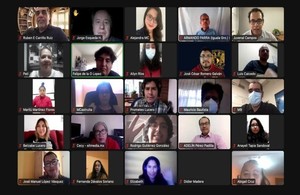Boost for farming innovation
Artificial Intelligence technology to optimise welfare in pigs, agri-robots to help speed up vegetable harvests and automation to increase fruit crop yields are just some of research and development projects to receive funding through the Farming Innovation Programme, it was announced today (Monday 22 August).
Details of these new innovative projects comes as further support was announced for farmers and growers with novel ideas to help grow food production, encourage sustainable practices and increase productivity, with the next rounds of the Feasibility Projects and the Small R&D Partnership Project competitions due to open shortly.
The £16.5 million of funding will help drive innovation in agriculture and horticulture and is part of the Government’s £270 million Farming Innovation Programme.
It is run in partnership with UK Research and Innovation, building upon their successful Transforming Food Production challenge.
Farming Innovation Minister Steve Double said:
We want to help unlock greater potential in our already brilliant farming and horticulture sector. Today’s first round of projects demonstrate how – with the right funding and support – there are great productivity and environmental sustainability gains to be made.
Our £270 million investment in farming innovation is designed to help take the UK’s world-leading research ideas and turn them into practical solutions to support healthy soils, abundant pollinators and clean water alongside profitable food production.
Katrina Hayter, challenge director for the Transforming Food Production challenge, said:
You only need look at the sheer breadth of projects that have received funding to see there are so many opportunities for innovation across the food sector. From animal health to crop productivity, the introduction of strategic support technology and the precise application of chemicals, it’s exciting to see so many concepts beginning to come to life.
When brought together, it shows how the whole food system can benefit from new ideas, with knowledge-sharing and collaboration at its core. We are keen to ensure farmers and growers remain at the heart of projects, bringing their valuable real-life experiences to the project consortia to ensure that each innovation stays focused on helping improve the day-to-day challenges faced by those in the food sector. We now look forward to supporting these projects further as they develop.
The Farming Innovation Programme aims to spark new ideas and collaboration across the sector to address long-term challenges such as producing nutritious food more efficiently whilst helping the sector to reduce greenhouse gas emissions to achieve net zero goals. Farmers, growers, foresters, businesses and researchers are being invited to collaborate and submit applications for these two new competitions:
- A £5.5 million competition for ‘Feasibility projects’ will offer grants for projects worth between £200,000 and £500,000 to support research and development through the difficult testing phase of an idea to see if it is worth investing in further
- Winners of the ‘Small R&D Partnership’ competition will receive a share of the £11 million grant funding for industrial research projects worth between £1 million and £3 million to further develop new solutions that will ultimately address major on-farm or immediate post farmgate challenges or opportunities such as enhancing productivity and sustainability.
Details of the successful applications from the first round of Small R&D Partnership Projects, Feasibility Projects and Research Starter Projects, that were launched in October 2021 were shared by UKRI today. These include:
- Farmsense’s use of innovative sensor technology and AI to optimise welfare in pigs;
- Blue Planet II, a new project which aims to build upon its highly successful autonomous technology to further increase fruit crop yield and quality;
- A new project from ‘Muddy Machines’, whose agri-robot concepts aim to speed up vegetable harvesting with sustainability and reliability at their core.
Altogether Defra expects to spend around £600 million on grants and other support for farmers to invest in productivity, animal health and welfare, innovation, research and development over the next three years.

